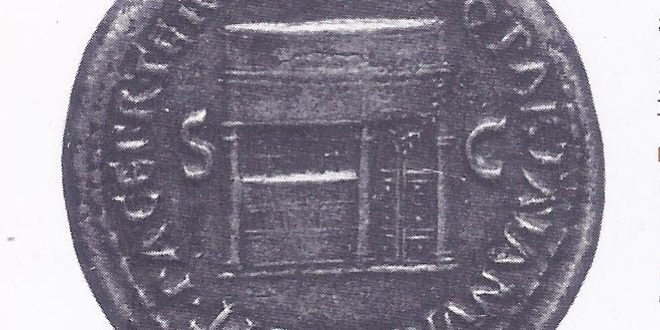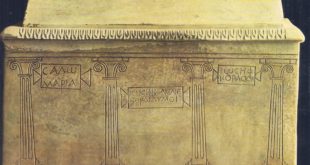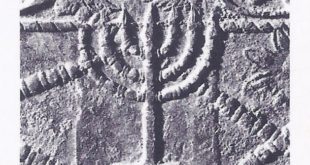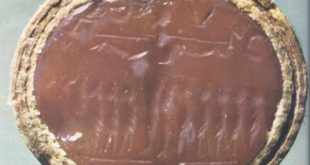Octavian delivers the state from that was plunged into depression. A few weeks after January 1 in the year 29 B.C. the doors of the temple of Janus in Rome were closed. This traditional act symbolized that the Roman state was at peace. The closing of the doors on this occasion was greeted with more than the usual joy and relief that marked the termination of war. Since the murder of Julius Caesar in the Forum in the year 44 B.C., Rome had been plunged, with little intermission, in civil war. From that long agony, the state had finally been delivered by Octavian’s victory at Actium and the subsequent deaths of Antony and Cleopatra. The Senate and people of Rome were, in consequence, deeply grateful to the man who had brought them this relief, and they were disposed to accept his leadership.
Augustus Octavian Supreme
Octavian knew this and recognized the strength of his present position, but he was also astute and cautious, as well as being a statesman profoundly concerned with the future well-being of Rome. He perceived what were the realities of power and what were its trappings; and he was careful never to confuse the two.

His uncle, Julius Caesar, of a more flamboyant nature than his own, in the moment of his power had offended Republican principles and had fallen beneath the knives of ardent Republicans. The civil war had taken a heavy toll of these Roman oligarchs; but even in the year 29 Rome was still officially and by a long and revered tradition, a republic. It would be imprudent to disregard the fact.
Weaknesses of Republican Structure
The civil war and the struggle between Pompey and Caesar that had preceded it, had revealed the weakness of the Republican constitution. It could not cope with the new power situation that Rome’s acquisition of empire had brought. The conquest and control of lands, some of them rich and famous, inevitably meant that the commanders concerned won great fame and acquired immense power. The large armies that they commanded tended to give them personal allegiance. They looked to them for reward rather than to the Senate of distant Rome.
The opportunities afforded by such commands naturally tempted the ambitious. The struggle to obtain them was fierce and expensive. Once obtained, the successful competitor exploited his opportunities to the fullest and sought to extend his term of office. Back in Rome, his enemies prepared for his recall, with accusations of maladministration and his friends fought to strengthen his position. The perils of such a situation had been demonstrated by the careers of both Pompey and Caesar — presaged by the earlier struggle between Sulla and Marius. The ambition of Marc Antony, united with that of Cleopatra, had threatened the very sovereignty of Rome itself.
Transfer of Power to Octavian
The problem that confronted Octavian after Actium was that of a reconstruction of the state that would preserve the semblance of its traditional Republican form yet obviate its manifest weaknesses by investing the reality of power in himself. This he secured by contriving to have various crucial offices assigned to him by the Senate. At the same time, he strove to appear as the champion par excellence of the Republic’s laws and constitution. Thus in 27 B.C., he dramatically resigned all the offices which he had acquired since 43 B.C. In exchange, the Senate granted him the imperium or command over all the armed forces for the next ten years. This also gave him control over those provinces in which armies were located.
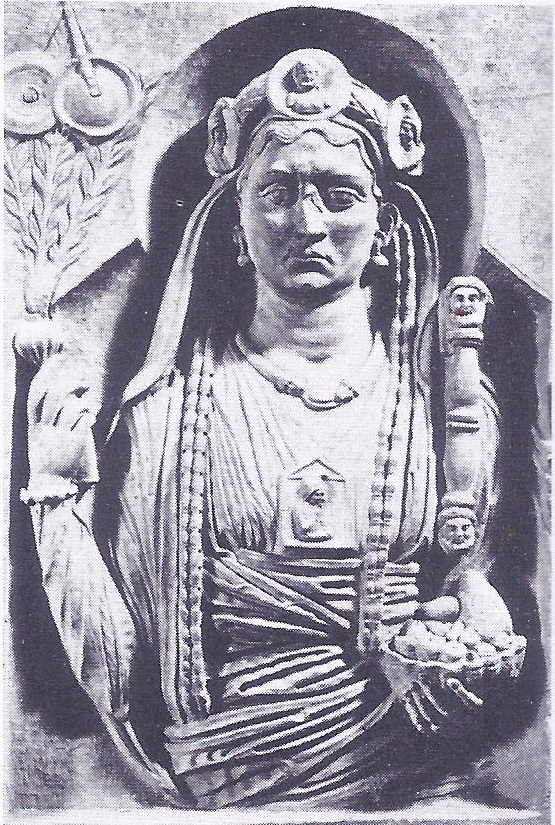
Augustus Octavian
The Senate also bestowed on him the title of “Augustus.” It is difficult to define the exact meaning of this title, by which Octavian has subsequently become known. According to the historian Dio, it signified “as being something more than human.” Suetonius reports that there was also a suggestion that he should take the name of Romulus as the second founder of Rome. This was rejected because Romulus had been a king and Octavian would never be connected with this office or title. Indeed, Octavian was most careful to use no exceptional title for himself. He preferred to call himself princeps, in the sense of being the leading citizen of the state. He also kept the military title of imperator, which was justified by his command of the Roman armies. In time, as “Emperor,” the title became the peculiar designation of the head of the Roman Empire.
Social and Religious Reforms
Augustus set in motion a number of measures designed to restore the social, moral and economic wellbeing of the state. In particular, by a series of marriage-laws he sought to increase the true Roman stock which, for a variety of reasons, had been steadily dwindling. He tried also to revive the antique Roman virtues and improve the moral tone of society by re-animating Rome’s ancient religion. Priesthoods, such as those of the Flamen Dialis and the Fratres Arvales, were reconstituted. New temples were built, including one to Apollo on the Palatine (a tribute to the Apollo of Actium, believed to have given Augustus the victory), and to Mars Ultor, as the avenger of Caesar’s assassination. Augustus himself assumed the title of Pontifex Maximus (high or chief priest); the title was inherited by successive emperors and finally adopted by the Pope of Rome. It is generally thought that Virgil and Horace supported Augustus in his religious policy through their poetry. Such measures inevitably have the air of a precious antiquarianism. For, although they were punctiliously performed, the vitality of the ancient rites was now beyond recall.

Emperor Worship
There was, however, a development in the state-religion at this time which was destined to have important repercussions later, particularly for emergent Christianity. It had long been the custom in the ancient Near East for divine honours to be paid to kings and rulers: e.g. the Egyptian Pharaoh had been worshiped as the incarnate son of the sun-god Ré. Alexander the Great had regarded himself as divine; and many eastern peoples readily agreed to acclaim as a god one of such stupendous genius and success. In turn, the later Hellenistic rulers expected and were accorded divine honours.

Julius Caesar Deified
To Republican Rome such ideas were naturally abhorrent, but upheavals of the civil war had prepared the way for a certain change of view. Julius Caesar had been deified after his death and in the year 29 B.C. a temple had been solemnly dedicated in Rome to him as “Divus Julius.” In consequence of this deification Octavian as the heir of Julius had received the title of “Divi filius.” His later title of Augustus reinforced the tendency to regard him as having more than human status. However, the association of deification and kingship was probably enough to prevent the veneration paid to him from turning into actual worship in Rome and Italy during his life.

Divus Augustus Octavian
It was otherwise in the provinces that Temples were dedicated to Roma and Augustus in Pergamum and Nicomedia. In 12 B.C. Drusus consecrated an altar at Lugdunum in Gaul to Roma and Augustus. The association of the genius of the city and the Emperor is significant; for the cult of the two came to constitute a declaration of political loyalty. On September 17, A.D. 14, shortly after his death, the Senate decreed that Augustus should take his place among the gods of the state as “Divus Augustus.” His golden image was placed on a couch in the temple of Mars to receive divine honours.

Architect of the Roman Empire
Augustus has been called the “architect of the Roman Empire” and there is abundant justification for the title. As he is reputed to have said of his building activity: “I found Rome of brick, I leave it of marble,” so he might have said: “I found the Roman state a Republican ruin. I leave it a strong monarchical Empire.” Although eschewing the title and trappings of kingship, Augustus had gathered all effective power into his own hands. Out of the chaos he had inherited, he fashioned the imperial Rome that was to dominate the ancient world for the next four centuries and the imagination of Europe for long centuries after. The hands into which such absolute power had been gathered were strong and the mind which controlled and directed that power was far-seeing and firm.

The Army’s Power
However, Augustus could not ensure that he would be succeeded by emperors equally sagacious and strong. Moreover, although he succeeded in controlling the power of the army, the fate of Rome always rested ultimately on the army — not only for its defense against the barbarian peoples beyond its frontiers, but also for its own internal stability and wellbeing. Thus the future of the Empire and with it the civilization of the ancient world, depended upon two problematic factors: the ability of the Emperor and the efficient loyalty of the army.
Decline and Fall
The subsequent history of the Roman Empire is that of the operation and interaction of these two factors. Its main theme is the growing awareness of the army, or those who commanded its most powerful contingents, that they could both make and destroy emperors. The internecine warfare that resulted, punctuated only by short intervals of peace, gradually sapped both the economic and military strength of the Empire.
The collapse was gradual but inevitable. Rome itself was twice sacked by barbarian armies before the resignation of the Emperor Romulus Augustulus in 476 brought the Western Empire to an end. However, the division of the Empire by Constantine and the founding of Constantinople in 330 as the capital of the Eastern Empire, ensured the continuance of the Roman imperium in the eastern Mediterranean lands for another thousand years — indeed until the fall of Constantinople to the Ottoman Turks in 1453.

We will now see how the problem of assimilating conquered peoples became too big for Rome and how a major disaster limited future expansion of the Empire.
